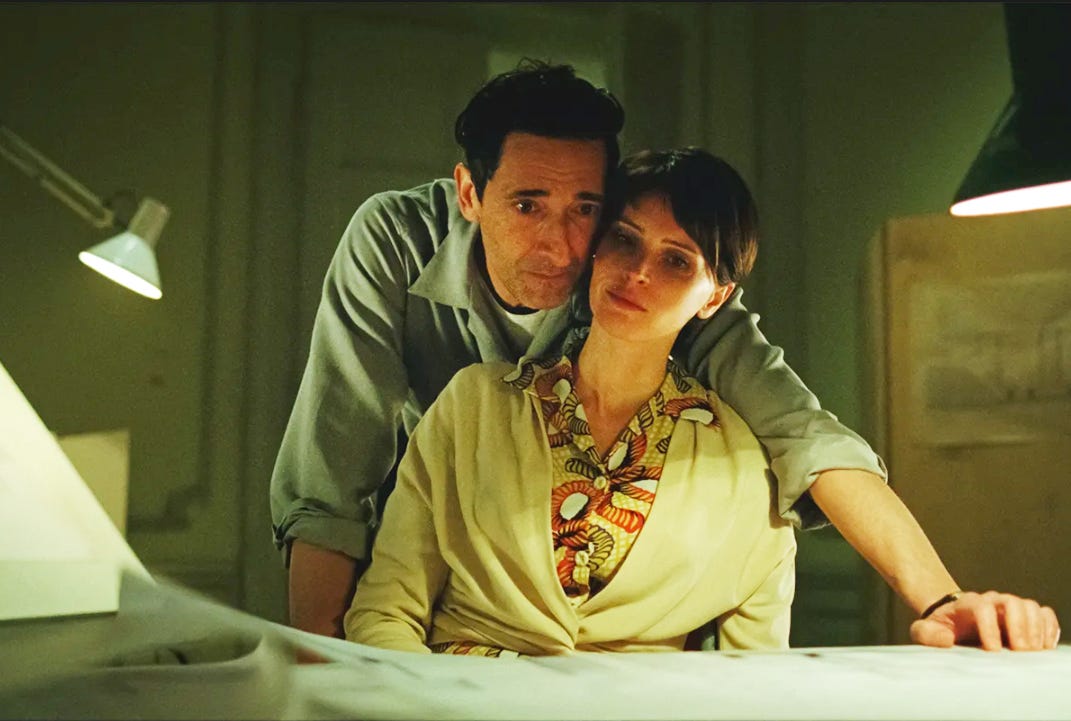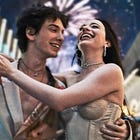The Brutalist (2024) This 3 hour epic could sweep the board at The Oscars
“I will follow you until I die”

As long term readers of my award winning film reviews will attest I love a good juxtaposition, and this year’s hot Oscar favourite The Brutalist is swimming in them. Love, in all its forms, is evident, from the yearning to be with a loved one although separated in the discombobulating times of a post-war world through to unrequited love, an impossible love and even the love for another although heavily tinged with intellectual envy. We have continuing juxtapositions between faith and cultural acceptance, immigration versus assimilation, capitalism set against cold hearted exploitation and even the creation of monuments to moments of the past that echo loudly to our present day that whilst in the process of construction were envisioned to shape the future and which, arguably, now define it, recognise and revere it. For The Brutalist can be many things and viewed in many and varied ways, from the continuance of the American Century left largely untouched by the devastation and destruction of European cities, the creation of the state of Israel and the ramifications this action continues to echo through to our present day, the movement of people and pieces on a geo-political chessboard or, in its simplest form, a 3+ hour epic tale of a visionary artist of brutalist architecture over four parts (including an Overture and an Epilogue) and which also includes a mid-film intermission!
All of this and much, much more ensures The Brutalist is Oscar fare and don’t be surprised if its found a very approving audience within Academy viewing circles.
Here’s another juxtaposition I saw and one on which I hope to remain a lone and solitary voice. I may be overly enamoured with the films of Paul Thomas Anderson but I couldn’t help but draw comparisons with his post-war opus to Scientology and The Master and Brady Corbet’s Oscar favourite here. The timeframes may be similar, at least initially, and there’s the connection of religious faith if we can accept that whatever Scientology may be it’s faith based, but the comparisons and juxtapositions I draw are of the film’s two leading men, their foibles, eccentricities, desires and their, unrequited or indeed unwanted, love for the other. Whereas in PT Anderson’s underappreciated masterpiece you have the Oscar nominated turn of Philip Seymour Hoffman yearning for the devotional love of his similarly Oscar nominated co-star Joaquin Phoenix, here we have Guy Pearce on stellar and surely Oscar winning form desiring not only of the intellectual love and appreciation of Adrien Brody (a shoe in for Oscar success) but also of his unbridled love too. It screams from Pearce’s every pore from the minute he sets eyes on Brody’s character in their second interaction of the film. The same could be said of Seymour Hoffman and the drinking of Phoenix’s alcoholic potion in the earliest frames of The Master and yes there’s a somewhat paternal love for the other (especially in The Master) but we also have the heartbreak of seeing a would be friend and lover returning to the fold (in both films) the dismissal of them from their lives (repeatedly) and whilst I don’t have a comparison for Philip Seymour Hoffman singing “Slow Boat to China” to a crying and broken Joaquin Phoenix (and the real outward expression of his lifetime of yearning for the younger man) I do have the comparison of Phoenix’s dependency on alcohol and here, the character of Brody and his desperate reliance on heroin.
Maybe just me and a lone voice and what would I care if I am? Regardless, in a largely male dominated film Felicity Jones, ably supported by both Raffey Cassidy and Ariane Labed, overshadows even Adrien Brody’s performance from the second part onward and The Brutalist (even though I LOVE The Substance, Anora and Emilia Pérez and in that order of cinematic love too) must surely sweep the Oscars board a week on Sunday and to whet your appetite still further, here are the opening 14 minutes:
Following a raft of production credits and the sounds of a faraway air raid siren, a black screen slowly dissolves into a faint outline of a circle with both a triangle and a square inside forming an arrow shape figure as equally slowly the word “OVERTURE” appears in white in the middle of the circle. From a fade to black and a blank turquoise coloured screen we hear a scream from an as yet unseen lady before a young distressed lady is pushed from the left of the screen to the right and forced to sit on a chair by a table beneath a window as orders are barked at her in Russian. She refuses or is unable or unwilling to answer a raft of questions on who she is, her family, her mother and her previous address in Budapest. With the young lady remaining central in the frame the scene around her slowly dissolves to a wider view of the lady still refusing to answer repeated questions, still distressed, still sitting at the same table with snow still falling and visible through the window behind her, but the room surrounding her, despite the wider shot, now appears smaller and barely big enough to contain the table at which the young lady is sitting.
Following another fade to black a narration begins but which is in fact a love letter and translated from Hungarian…
“László, I’m alive”
We cut to László Tóth (Adrien Brody) shot from above but upside down and barely visible in almost pitch black darkness.
“Attila tells me you too are alive and enroute to him from Bremerhaven. Rejoice!”
Sitting up now, clearly in distress and although his situation is not clearly evident in the near pitch black darkness, László, surrounded in a hazy, yellow/green hue that will continue to shroud his situation throughout the early minutes of the film, is pictured as a panicked, dishevelled man as the narration and love letter continues:
“I cried out in ecstasy to have news of you”
Although still barely seen or visible, László is now mainly heard arguing with an unseen man over his luggage as the unseen man urges him “Hurry László or we’ll be last in the queue” as the letter continues once more:
“Zsófia is with me, though she is frail, strange, and quite ill”
László scrambles around in the yellow/green hue of the darkness that surrounds him, a light, the first in his continuing darkness, now visible in the near distance.
“We anxiously await our being repatriated but recently, she has not been herself, which has, in turn, roused unnecessary suspicions with local officials”
Still shrouded in a yellow/green hue, László is now far more visible as cries from nearby children can be heard amid more individual shards of light and more movement all around him as he scrambles around and above for his luggage.
“Fortunately, a few Soviet boys have taken a liking to us. They pity your poor niece in particular, who has grown fuller, even lovelier, since you last set eyes on her. These lonesome young servicemen are ostensibly entranced by such a radiant creature’s commitment to absolute silence”
László, still surrounded by that almost ever present yellow/green tinged hue is now seen fully for the first time, carrying his luggage above his head, apologising profusely as he makes his way through a darkness now clearly lifting.
“The Soviets have helped us relocate to a nearby shelter for displaced persons in Vas. They encourage us to “Enjoy our Freedoms”, but I am reminded of Goethe”
László meanwhile is now walking towards the brightest light of all in his continuing darkness and what appears to be the entrance to or exit from, a tunnel.
“None are more hopelessly enslaved than those who falsely believe themselves free! I make no mistake, we are not yet free”
Through the light now (was it, or could it have been a tunnel?) László continues walking amid crowds of people on either side of him.
“You, like myself, must be envisioning so many terrible, awful, awful things, but it is better that your thoughts do not get the best of you”
Confused, it appears László is walking in almost circles. More lights. More people. More confusion.
“It is neither better nor worse than you might imagine”
László now appears to be climbing a set of stairs.
“I have kept myself mostly to myself”
Now seen fully and in the brightest of light in the entire film so far, László is now seen peering through a small round window and a first sighting of daylight.
“More importantly, I have defended Zsófia from unwanted advances”
Darkness descends around László once more as he appears to be climbing another set of stairs.
“Below is an address I am told for mail in Vas. Please write to me at once when you have received this”
Colour is now visible surrounding László, a streak of red paint on one wall, more people, more confusion, more stairs, the opening of what appear to be a set of doors in the near distance.
“I am certain now there is nothing left for us here”
Bursting through the now open doors, László and an unnamed friend laugh uncontrollably at seeing daylight for the first time as the Statue of Liberty hovers slowly into view, upside down.
“Go to America and I will follow you”
The Statue of Liberty turns 45 degrees on screen.
“Faithfully, Erzsébet”
We cut to the Statue of Liberty once more but now a mirror image, still at a 45 degree angle, and on the other side of the screen.
From this surreal image we cut again and now to a dockside passenger waiting room and a tired László among a large crowd of men, women and children, all of whom have a large number affixed to their jackets as instructions are relayed (and also translated in Hebrew) regarding “orientation meetings” and “daily classes”. As the camera slowly moves from right to left we find a tired and dishevelled László looking downbeat and exhausted as announcements continue as to available hotels and bus transport before another quick cut to the bright lights of night time New York City amid a continuing radio announcement and quickly once more, the bright lights of a hotel amid light jazz, piano music and a host of street prostitutes. Inside we now find László in one corner and a still unnamed friend in the other and despite the sexual attention of a prostitute, László is unable to perform. “Just fuck her!” his friend shouts before they exchange a verbal joust in Hungarian and now an apologetic László states quietly “It has been sometime, sorry”. Focussing now entirely on László and the prostitute, their at first friendly verbal exchange now becomes tired and awkward as the prostitute first seeks compliments on her appearance before, somewhat jokingly and yet still jarring, she awkwardly announces “Your face is ugly” to which László can only concur through exasperation and “I know it is”. Now leaving the hotel, a lady at the entrance suggests László might be happier in the company of boys and “brothers, with dark skin, but handsome”. Lighting a cigarette, László simply declines.
We cut to the following morning and László together with a still unnamed friend running furiously and shouting at a bus, their transport away from New York City, to stop. The hiss of the air brakes signals the bus is at a stop and waiting for László to board, he is now full of relieved smiles and a multitude of thanks for his friend. Now on board, László spins a silver coin before catching it and passing it to his friend “for the luck” as he now walks to the back of the bus and waves to his friend. The surreal opening credits of the film now commence with an old school crawl of titles, actors and actresses passing from right to left across the screen as we follow the bus leaving New York City for Philadelphia through first daytime and then a red sunset tinged early evening and finally…
“PART 1 — THE ENIGMA OF ARRIVAL (1947–1952)”
In a 4:3 frame ratio we first see a brightly coloured commercial amid promises of life, liberty and prosperity for the inhabitants of the state of Pennsylvania and as promises of freedom of religion, progress, innovation and plentiful jobs within the state’s steel and manufacturing industries continue, we cut to László peering through the bus window and out onto the wider world. He now, for unexplained reasons, has a clearly broken, swollen and bloodied nose as the bus finally arrives at a cold, snow covered Philadelphia and immediately on leaving the bus he is engulfed in the arms of his cousin “Attila” (Alessandro Nivola) as he sobs uncontrollably.
“Erzsébet is alive” announces Attila quickly and to the clear astonishment and yet deep joy of László who slams his cousin against the side of the bus. Weeping now, László needs more confirmation, to which Attila responds “I have a letter from her” and “Your Erzsébet is alive and she is with Zsófia”. Crying uncontrollably as he grips his cousin in a vice-like grip, László can only repeat the word “yes” over and over again before thanking his cousin for the unbelievable news as he continues to sob in his arms.
And if the above scene doesn’t win Adrien Brody the Oscar for Best Actor next month I’d be mightily surprised, as I will be if The Brutalist doesn’t, in Oscar parlance, sweep the board.
Time will tell.
It always does.
Treat yourself to The Brutalist sometime.
Thanks for reading. I hope this message in a bottle in The Matrix finds you well, prospering, and the right way up in an upside down world.
Whilst you’re here I may as well brag about the release of my trilogy of recently self-published books. Beautiful covers eh! As the title(s) would suggest, this is my life at the movies or at least from 1980 to 2024, and in volume 1 you’ll find 80 spoiler free appraisals of movies from debut filmmakers, 91 of the very best films appraised with love and absent of spoilers from 1990–2024 in volume 2, and in volume 3 you’ll find career “specials” on Paul Thomas Anderson and Quentin Tarantino together with the very best of the rest and another 87 spoiler free film reviews from 2001–2024.
All available in hardback and paperback and here are some handy links:
"A Life at the Movies Vol.1" - link to Amazon
"A Life at the Movies Vol.2" - link to Amazon
"A Life at the Movies Vol.3" - link to Amazon









Perfect and gripping review!
Could and should. So good.